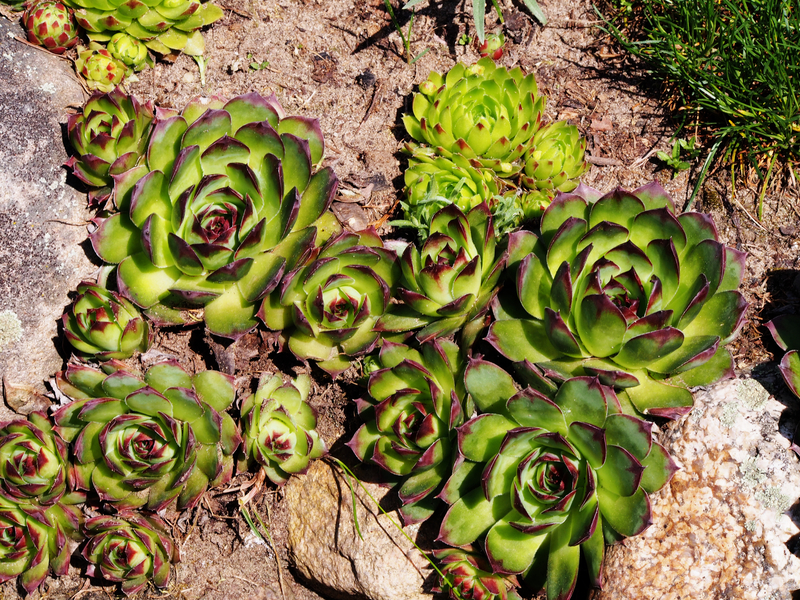Converting Organic Waste to Lush Soil
Posted on 07/09/2025
Converting Organic Waste to Lush Soil: A Comprehensive Guide
Converting organic waste into rich, fertile soil is one of the most effective ways to support environmental sustainability, reduce landfill usage, and create healthy gardens. This process, commonly known as composting, transforms kitchen scraps, yard clippings, and other compostable materials into nutrient-rich soil amendments that benefit both plants and the planet.

Understanding Organic Waste and its Environmental Impact
Organic waste encompasses a variety of biodegradable materials, including food scraps, grass clippings, leaves, and even paper products. Globally, an astonishing amount of organic material gets sent to landfills each year. This not only wastes valuable resources but also contributes to harmful greenhouse gas emissions as organic matter decomposes anaerobically (without oxygen).
Turning organic waste into soil through composting addresses these problems by creating a cycle where waste becomes a resource. Rather than contributing to landfill overflows, you generate lush, fertile soil -- a valuable commodity for gardeners, farmers, and landscapers alike.
Why Convert Kitchen and Yard Waste into Rich Soil?
- Environmental Benefits: Divert organic material from landfills, reducing methane emissions.
- Soil Enrichment: Improve soil structure, increase moisture retention, and support beneficial microbial activity.
- Cost Savings: Reduce the need to purchase commercial fertilizers and soil amendments.
- Community Health: Lower pollution, encourage gardening, and improve access to fresh produce.
Types of Organic Waste Suited for Composting
- Kitchen scraps: Vegetable peels, fruit cores, eggshells, coffee grounds, tea bags.
- Yard debris: Grass clippings, leaves, small branches, plant trimmings.
- Household items: Paper towels, napkins, cardboard (uncoated), shredded newspaper.
- Animal manure: From herbivores like rabbits, cows, and chickens (not from pets like dogs or cats).
It's important to avoid adding meats, dairy, fats, diseased plants, and pet feces, as these can attract pests, create foul odors, or introduce harmful pathogens.
The Science Behind Composting: How Organic Waste Becomes Lush Soil
Composting is a biological process where microorganisms -- primarily bacteria, fungi, and actinomycetes -- decompose organic matter under controlled, aerobic (oxygen-rich) conditions. The process involves two main stages:
- Active decomposition: Microbes consume organic materials, breaking them down into simpler compounds. Heat, carbon dioxide, and water vapor are byproducts.
- Curing or maturation: The compost cools, and more complex organisms (worms, beetles) break down any remaining material, resulting in dark, crumbly, earthy-smelling humus.
Crucial Elements in Composting
- Carbon (browns): Provides energy for microbes. Examples: dry leaves, straw, sawdust, cardboard.
- Nitrogen (greens): Essential for protein synthesis. Examples: grass clippings, kitchen scraps, manure.
- Oxygen: Needed for aerobic decomposition -- regular turning introduces air.
- Moisture: Aiding in microbe activity. Compost should be as moist as a wrung-out sponge.
Balancing carbon and nitrogen is key -- a ratio of ~30:1 carbon to nitrogen yields optimal decomposition. Pile too much carbon and the process slows; too much nitrogen and the compost may become soggy and smelly.
Methods for Converting Organic Waste Into Fertile Soil
1. Traditional Backyard Composting
The classic approach utilizes a pile or enclosed bin where organic waste is regularly added, mixed, and monitored. Here's a quick overview:
- Start with a layer of coarse material (twigs, straw) to promote airflow at the base.
- Alternate greens and browns in 2:1 layers, moistening as you go.
- Turn the pile every 1-2 weeks to add oxygen and promote even decomposition.
- Within 2-6 months, materials break down into dark, crumbly compost.
2. Vermicomposting
In this method, specialized worms (usually red wigglers) consume table scraps and manure, transforming them into worm castings -- a super-fertile soil amendment prized for its plant-boosting properties.
- Worms live in moist bedding (shredded paper, leaves) within a bin protected from extreme temperatures and direct sunlight.
- Regularly feed them chopped fruit, vegetables, and coffee grounds.
- Harvest finished compost every 2-3 months for use in gardens or houseplants.
3. Bokashi Composting
This innovative method uses beneficial microorganisms to ferment organic waste in airtight containers. Unlike aerobic composting, Bokashi is an anaerobic process and can handle some foods that regular compost piles cannot -- like small amounts of cooked food or dairy.
- Add waste to a Bokashi bin, sprinkling with bran inoculated with microbes after each layer.
- Seal tightly and allow it to ferment for two weeks.
- Then, bury the material in soil where it fully breaks down, enriching it.
4. Trench Composting
Perfect for home gardeners looking for a low-effort solution. Organic waste is simply buried 8-12 inches below the soil surface, directly in garden beds, where it decomposes in place and feeds your plants' roots.
Steps to Start Your Own Composting System at Home
- Select a Location: Choose a shady, well-drained spot near a water source.
- Gather Supplies: Ideally, have a bin (store-bought or DIY), garden fork or shovel, and a collection container for kitchen scraps.
- Build Your Pile: Start with coarse material for airflow, then add alternating layers of greens and browns.
- Maintain Regularly: Monitor moisture (should be damp, not soggy), and turn every 1-2 weeks for aeration.
- Harvest Rich Compost: In 3-6 months, your organic waste will have converted to lush, dark soil. Sift and use it in your garden beds, lawns, or potted plants.
Tips for Speeding Up the Process of Transforming Organic Waste to Soil
- Chop materials into smaller pieces for faster decomposition.
- Maintain balance of carbon to nitrogen to fuel microbial activity.
- Turn compost often to add oxygen and prevent matting.
- Keep it moist but never soggy; microbes need water to thrive.
- Add activators like finished compost, aged manure, or commercial starters to speed up the breakdown.
How to Use Finished Compost: Turning Waste into Gardening Gold
Once your compost is ready, it should resemble dark, crumbly earth with an earthy smell. Here's how to use this nutrient-rich organic soil amendment:
- Top-dress garden beds: Spread a 1-2 inch layer over existing soil to feed plant roots and suppress weeds.
- Mix into potting soil: Blend with your potting mix for houseplants, giving them essential nutrients naturally.
- Fertilize lawns: Rake compost thinly over your lawn to improve grass health and soil structure.
- Revitalize trees and shrubs: Apply around the base to support growth and fight off pests.
Common Mistakes to Avoid When Converting Organic Waste to Soil
- Adding the wrong materials: Meat, dairy, oily foods, and pet manures can cause odors and disease risks.
- Letting the pile dry out: Microbes require moisture; add water as needed.
- Neglecting to turn your compost: Lack of aeration can lead to slow decomposition and odor issues.
- Overloading with one type of waste: Balance is crucial for successful composting.

Frequently Asked Questions About Organic Waste Conversion
How long does it take to turn food scraps into garden-ready soil?
With proper aeration, moisture, and balance, compost can be ready in as little as 2-3 months in hot weather. Factors such as pile size, ingredients, and composting method can greatly affect timeframes.
Is composting smelly?
If managed well, compost should smell earthy -- not foul. Bad odors come from excess moisture, insufficient oxygen, or incorrect materials.
Can I compost during winter?
Yes, though decomposition slows in cold climates. Insulated bins or indoor worm composters (vermicomposting) can keep the process going year-round.
Benefits of Lush, Compost-Enriched Soil in Gardens
- Boosts plant health with abundant, slow-release nutrients and promotes vibrant blooms and fruit.
- Improves soil structure, which allows roots to grow deeply and access water and nutrients.
- Reduces plant diseases thanks to beneficial microbes that fight off soil-borne pathogens.
- Increases water retention, helping gardens thrive even in drought conditions.
Conclusion: Embrace the Power of Compost for Greener Tomorrows
Converting organic waste into lush soil is truly a win-win for households and the planet. By embracing composting, you divert waste from overflowing landfills while nurturing your own garden with a natural and powerful soil builder. Whether you prefer traditional piles, worm bins, Bokashi, or trench composting, there's a strategy for everyone to reclaim their organic discards and build a healthier ecosystem.
Get started today -- turn your food scraps and yard trimmings into fertile, living earth. The cycle is simple: waste, compost, grow. Your garden and the environment will both thank you.
Related Keywords:
- Organic waste to soil conversion
- Composting kitchen waste for gardens
- Homemade compost for lush soil
- Transforming yard debris into fertile earth
- Eco-friendly waste management for soil enrichment
By following these tips and principles, anyone can successfully convert their household organic waste into lush, productive soil, fostering both environmental responsibility and abundant gardens.
Latest Posts
Shade-Tolerant Evergreen Climbers: A Solution for Dark Spaces
Ensuring Longevity in Your Orchids
Discover the Best Techniques for Shaping Impressive Hedges

